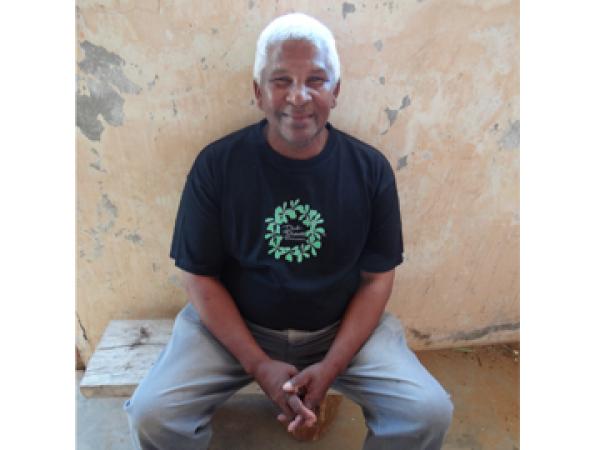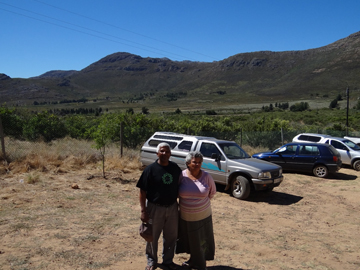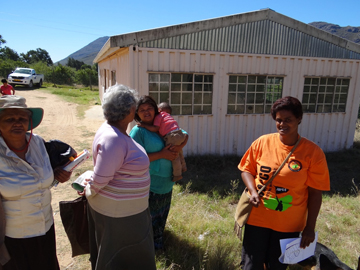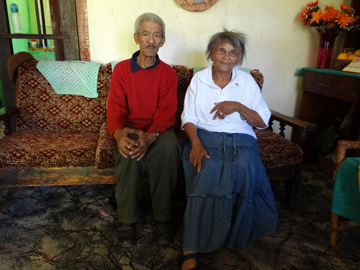Elandskloof 18 years after restitution

The Elandskloof community, forcefully removed from their land in 1962, was the first successful restitution case in post-apartheid South Africa. Yet, the way the process has unfolded, has left several community members feeling angry and frustrated, 18 years after their historic victory.
GroundUp visited Elandskloof, several kilometres above Citrusdal in the Cedarberg mountains, to speak to prominent members of the community. The alleged disconnect between the Communal Property Association (CPA) and the community has caused much unhappiness.
In a dilapidated structure below the former school building where the Elandskloof community meetings are held, John Januarie related his story:
“My father was the chair of the Elandskloof community many years ago. He agitated for a farm, was sent to jail and got a fine,” says Januarie.
“In 1962, when the land was bought from the missionary by farmers, the community was chased away … The farmer came and chased us away and burned our stuff. When the pigs and chickens were burned, then the community had to go.
‘When the land, church and school was taken away we went to have school under the trees. They locked the school doors. We had school under the pear trees until September.
“We had to leave after that, I was 10 years old.
“We walked with only what we could carry. We went to sleep in the bushes. Other people could fetch stuff, but our family couldn’t. We went to stay at another farmer with nothing. We had to build a shack. We all got very wet from sleeping in the bushes.”
Then, after the new government came to power in 1994, “we all stood together and this was the first restitution place. We came back. But it was very different to when we left. When we got back the land was restituted as communal land. We couldn’t do small farming. This made the community fight.”
“My wife looked up the definition of restitution. It means giving back … I don’t go to meetings anymore because I’m tired. It’s killing me the way the leaders of the CPA go about it. We are slaves. We’ve never had it as bad as it is now. They’re not listening, these people. We are slaves.”
“My heart is burning because this place is going to waste. I grew up with the soil and enjoyed it. Before I went to school I watered plants. When we had to plough, I put donkeys in front of the plough. But what are our children doing? We need help, to get off the ground. Then after that, we will be self-sufficient. I’m not worried about myself anymore, I’m worried about my five boys. I can’t give them what they need, there’s no opportunity. They can’t get jobs.”
“I am not allowed to work this land because it is communal. Our ancestors already paid for the land and could work this land. Now it’s all communal. We can’t work. We are also sitting with the problem that we don’t have money to buy modern technology. We suffered from 1962 until now. We had pigs, cattle, sheep. Today we have nothing, nothing. We are slaves.”
‘They’re [Elandskloof CPA] under administration. That man [the CPA chairman] is not listening to what we’re saying. They don’t come to the meeting to plan with the people, they plan by themselves.”
“It was a place full of love, and now it’s full of hate.”
“I took my children to look at the land and told them to get up and make something of it because there is a lot of wealth and potential in this land. There is a pretty view that would be ideal for tourism and rich land for agriculture. We can till and work the land but need planning and money which the CPA doesn’t discuss with us.
“We don’t need to suffer if we can just get better leadership and assistance, just one Good Samaritan who could help. So I’m not talking to them anymore. Anyone who wants to farm should be given land to farm. We can pay something into a communal kitty so everyone in the community would benefit from this arrangement. These people are not doing anything. People are drinking up all the money. People come here to talk and do nothing.
“Now the land has been given back communally, but it has been taken away from families. The CPA is not working. I am not happy with the CPA. Before 1962, every household worked on its own. People were loving in 1962. If there was a sickness, someone would ring the church bell. People would walk with lanterns to the ill person. We would hold vigils. It was a place full of love, and now it’s full of hate.”
“It would be better if everyone worked for themselves. We need a committee to manage the place but everyone should work for themselves. I would work harder for myself because I want a better life for my children. Then I would pay something to community every year. My parents paid every year. That land has already been paid for but now we have nothing. I would help my neighbour, we would help each other.
“We had to build everything from scratch. We’ve had 20 years of slavery, which is hard. I am not ashamed to say it. I say it to them [CPA and municipality] in meetings.”
After speaking to John, GroundUp met with his wife, Margie.
“Our hands are tied, we are powerless,” she said. “Before we left the land we had gardens, water, electricity, sanitation, everything, before we were removed. We want it back as it was before. We want restoration.”

John Januarie (left) with Margie Januarie (right) outside the former school hall, where the Elandskloof community meeting took place. Photo by Joshua Maserow.
Angela Dirkse added, ‘The Community hasn’t been informed. They [CPA] know nothing about rural development. Nothing about how to do funding or rural development.
“The chairperson cannot be chairperson. He’s not from Elandskloof.
“My son goes to school in Citrusdal. He can’t do his tasks. The bus comes once a day and there are no facilities; there’s nothing. No library, nothing. No shops for clothing. What must we do? It just stays the same. They [the CPA] make the decisions and then they say ‘we’ did this and ‘we’ did that.

Nettie Titus (left) stands with Margie Januarie (centre) and Angela Dirkse (right). The lady with the child in the back remained anonymous. Photo by Jason Jardem.
GroundUp also spoke to Aletta Titus, the first lady chairman of the Elandskloof committee before community matters were taken over by the CPA.
“We are the people of the history. People don’t want you to talk about history anymore. That which is past is painful. We are the people of history, the restitution. The youth and people who come to help don’t understand … We have received nothing back. We had our houses and gardens where we planted our own fruit. We had buchu. We had flowers and all those things which were ours.
“We lost all our buildings and with it the learning that happens in school … We lost a lot of things. The biggest thing was our living standards, our way of life. That’s how it is with Elandskloof. We don’t have activities to be a part of. There’s no day school or children’s guild. There is nothing for children, youth, or our adults.
“It seems as if our people don’t what to connect, cohere with the municipality. They should deliver services. We have title, we are owners of the land.
“We are very happy to have the land back. But we didn’t get the land back as asked for, we didn’t get what was lost.
“The farmers got R9 million from the state for this land. The government paid them out. What do we get? … We sit with empty hands.”

Saul Titus (left) sits for a photograph with his wife, Aleta Titus (right) in the living room of their house. Photo by Jason Jardem.
Thanks to Marlise Richter, Hester Mert and Christopher Richenburg of Sonke Gender Justice for assistance with translations from the Afrikaans.
Next: Enkanini’s “field of death”
Previous: Zimbabweans introduce South Africans to new greens
Letters
Dear Editor
During the 1950s my mother was a teacher at this school and my father taught at a one-man school on the farm Kunje in the Cederberg area. In this late stage of my life, I can recall so vividly the laid-back and peaceful existence of the people of Elandskloof. The old church and school stand out as beacons of my early childhood years. The farmer with the surname Van Rensburg if I recall correctly had a shop at the farmhouse where groceries and other small necessities could be bought. The abode where we lived was next to the school and amongst the huge pear trees. How I long to go back there just to relive my childhood in that God-given, beautiful and serene environment.

This article is licensed under a Creative Commons Attribution-NoDerivatives 4.0 International License.


